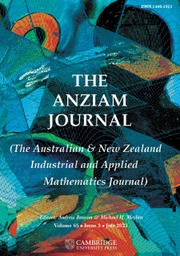Crossref Citations
This article has been cited by the following publications. This list is generated based on data provided by Crossref.
Hu, Qiying
Liu, Jianyong
and
Yue, Wuyi
2003.
Computational Science — ICCS 2003.
Vol. 2658,
Issue. ,
p.
64.
Xianping Guo
and
Hernandez-Lerma, O.
2003.
Drift and monotonicity conditions for continuous-time controlled markov chains with an average criterion.
IEEE Transactions on Automatic Control,
Vol. 48,
Issue. 2,
p.
236.
Guo, Xianping
and
Hernández-Lerma, Onésimo
2003.
Continuous-Time Controlled Markov Chains with Discounted Rewards.
Acta Applicandae Mathematica,
Vol. 79,
Issue. 3,
p.
195.
Guo, Xianping
and
Hernández-Lerma, Onésimo
2003.
Constrained Continuous-Time Markov Control Processes with Discounted Criteria.
Stochastic Analysis and Applications,
Vol. 21,
Issue. 2,
p.
379.
Guo, Xianping
and
Hernández-Lerma, Onésimo
2005.
Nonzero-sum games for continuous-time Markov chains with unbounded discounted payoffs.
Journal of Applied Probability,
Vol. 42,
Issue. 02,
p.
303.
Guo, Xianping
and
Cao, Xi-Ren
2005.
Optimal Control of Ergodic Continuous-Time Markov Chains with Average Sample-Path Rewards.
SIAM Journal on Control and Optimization,
Vol. 44,
Issue. 1,
p.
29.
Guo, Xianping
and
Hernández-Lerma, Onésimo
2005.
Nonzero-sum games for continuous-time Markov chains with unbounded discounted payoffs.
Journal of Applied Probability,
Vol. 42,
Issue. 2,
p.
303.
Guo, Xianping
and
Rieder, Ulrich
2006.
Average optimality for continuous-time Markov decision processes in Polish spaces.
The Annals of Applied Probability,
Vol. 16,
Issue. 2,
Guo, Xianping
Hernández-Lerma, Onésimo
Prieto-Rumeau, Tomás
Cao, Xi-Ren
Zhang, Junyu
Hu, Qiying
Lewis, Mark E.
and
Vélez, Ricardo
2006.
A survey of recent results on continuous-time Markov decision processes.
TOP,
Vol. 14,
Issue. 2,
p.
177.
Zhu, Quanxin
2007.
Average optimality inequality for continuous-time Markov decision processes in Polish spaces.
Mathematical Methods of Operations Research,
Vol. 66,
Issue. 2,
p.
299.
Zhang, Lanlan
and
Guo, Xianping
2008.
Constrained continuous-time Markov decision processes with average criteria.
Mathematical Methods of Operations Research,
Vol. 67,
Issue. 2,
p.
323.
Zhu, Quanxin
2008.
Average optimality for continuous-time Markov decision processes with a policy iteration approach.
Journal of Mathematical Analysis and Applications,
Vol. 339,
Issue. 1,
p.
691.
Guo, Xianping
and
Zhang, Lanlan
2011.
Total reward criteria for unconstrained/constrained continuous-time Markov decision processes.
Journal of Systems Science and Complexity,
Vol. 24,
Issue. 3,
p.
491.
Zayas-Caban, Gabriel
Xie, Jingui
Green, Linda
and
Lewis, Mark E
2014.
Optimal Control of an Emergency Room Triage and Treatment Process.
SSRN Electronic Journal,

